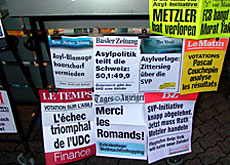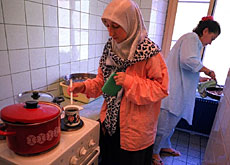Asylum vote shows divided country

One day after tougher asylum laws were rejected by a paper-thin majority, the Swiss press is asking who really won the ballot.
While the government may have snatched victory by a whisker, for many newspapers the real winner on Sunday was the rightwing People’s Party behind the proposal.
For the mass-market “Blick”, the real loser was the police and justice minister, Ruth Metzler, who oversees the application of Switzerland’s asylum laws.
“The People’s Party has touched a nerve with Swiss-Germans,” wrote the Blick.
“Metzler has lost touch with the average Swiss, who no longer feel at home and no longer trust the centrist parties.”
The “Bund” pointed out that if almost half the voters in Switzerland were prepared to give up the country’s asylum and humanitarian traditions, then there must be “deep-rooted and widely-felt frustration” among the population.
“When one of the ruling parties launches a radical initiative such as this alone, and almost wins, it shows that consensus is being strained,” wrote the paper.
“The government and the parliamentary majority may have won, but in a split country with ever-increasing disquiet.”
People’s Party
The “Berner Zeitung” added that the two ruling centre-right parties, the Radicals and the Christian Democrats, failed early on to realise how successful the People’s Party had been in making asylum a political issue.
This success, wrote the BZ, stemmed from the fact that “many people do not feel that the federal authorities and parliament take them seriously.”
The “Neue Zürcher Zeitung” said that the People’s Party could chalk up this ballot as a success after winning almost half the vote.
“The result is a show of strength that will have an effect on future policies.”
For the “Basler Zeitung”, Sunday’s vote showed that Switzerland was “split”. The paper added that the country’s political scene was becoming “polarised”, with the People’s Party playing the part of the opposition despite being a government party.
Disturbing result
The “Tages-Anzeiger” pointed out that it was “disturbing that so many said ‘yes’ to the asylum initiative”.
“A ‘yes’ vote would have done more harm than good, hurting people who need to be protected from persecution and civil wars,” wrote the paper.
It added that the close result gave the People’s Party the green light to use the issue of foreigners as a political weapon.
“The party will try to torpedo every attempt by the authorities to integrate foreigners.”
Complacency
In French-speaking Switzerland, where the initiative was less popular with voters, newspapers warned against complacency.
The “Tribune de Genève” said that while the result might come as a relief to many, Swiss voters should look at it more closely.
The vote was a sign that “people are increasingly fed up with Switzerland’s foreigners policy”, it said.
“The government needs to be clearer and braver in its choices. Current migration policy is neither realistic nor straightforward.”
For “Le Temps”, any relief will be short-lived. “The real political winner is the People’s Party.”
The paper also questioned whether the party should remain part of the government, an issue raised by many newspapers.
International opinion
The international media also noted how close the Swiss had come to abandoning their humanitarian tradition.
The International Herald Tribune said that if the initiative had been accepted “it would have effectively closed the door to asylum seekers in one of the richest countries in the world”.
The Tribune added that the People’s Party’s campaign had “tapped a vein of fear within the Swiss population that the rising foreign-born population is taking away resources needed for pensions and unemployment insurance”.
The French daily, “Le Figaro”, hinted that the result revealed a general feeling of dissatisfaction among the population. “The People’s Party has taken advantage of this and is riding the wave of discontent.”
Two of Germany’s biggest papers, the “Frankfurter Allgemeine Zeitung” (FAZ) and the “Süddeutsche Zeitung”, both signalled that a “yes” vote would have meant the end of Switzerland’s humanitarian tradition.
The FAZ added that once again a vote had shown the differences between French- and German-speakers in Switzerland.
The Süddeutsche Zeitung said that if the initiative had been accepted, it would have led to problems between the Swiss and their neighbours.
swissinfo

In compliance with the JTI standards
More: SWI swissinfo.ch certified by the Journalism Trust Initiative

You can find an overview of ongoing debates with our journalists here. Please join us!
If you want to start a conversation about a topic raised in this article or want to report factual errors, email us at english@swissinfo.ch.